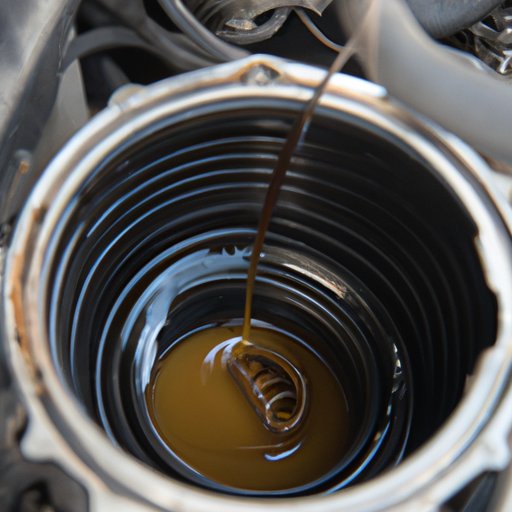
Introduction
If you own a car, you know how important it is to take care of routine maintenance. One critical aspect of car maintenance is changing your oil. Regular oil changes keep your engine running smoothly and help prevent costly repairs down the line. In this article, we’ll explore when you should get an oil change and why it’s so important for the health of your car.
The Importance of Frequent Oil Changes: Why You Need to Stay Up-to-Date
Oil is vital to the function of any car. It lubricates various engine components, reducing friction and wear, and helps maintain the proper temperature inside the engine. Over time, oil gets dirtier and less effective at performing these crucial functions, which is why it needs to be changed regularly. The benefits of frequent oil changes include improved engine performance, increased fuel efficiency, and a longer lifespan for your car.
According to Consumer Reports, neglecting routine maintenance like oil changes can reduce your car’s lifespan by up to 20%. That’s a significant decrease in the number of years your car can be on the road, and it could end up costing you more in the long run by needing to replace your car earlier than expected.
Don’t Skip the Oil Change: How Neglecting Routine Maintenance Can Impact Your Car’s Lifespan
Skipping oil changes can have a negative impact on your car’s lifespan. When old oil wears out, it can’t do its job effectively anymore, resulting in increased friction and heat buildup in your car’s engine. Over time, this can cause damage to critical components of your engine, leading to costly repairs down the line.
Neglecting routine maintenance isn’t wise for any car owner, as it can cause unexpected problems to arise. Keeping up with routine maintenance can help avoid these issues and keep your car running smoothly for longer.
When Should You Change Your Oil? Here’s How to Know When It’s Time
So, when should you change your oil? The standard answer has been every 3,000 miles, but this timeline can vary depending on several factors, such as the age of your car, how often you drive, and the type of oil you use.
Consulting your car’s owner’s manual is the best place to begin. It will provide guidelines for how often oil should be changed based on your car’s make and model. Other factors to consider include checking your oil level regularly and keeping an eye out for warning signs, such as burnt oil smells or a decrease in fuel efficiency. When in doubt, it’s always better to err on the side of caution and have your oil changed sooner rather than later.
One easy way to keep track of your oil changes is by marking the date on a calendar or setting reminders on your phone. Small steps like these can help ensure that your car stays healthy and running smoothly.
The Risks of Overdue Oil Changes: Understanding the Potential Consequences
Overdue oil changes can lead to engine wear and tear. When oil isn’t changed as needed, the engine components can start to break down, causing long-term damage that could be expensive to repair. Additionally, driving with overdue oil changes can lead to decreased fuel efficiency, which can have financial consequences in the long run.
According to the Car Care Council, delaying oil changes can lead to increased engine damage and decreased fuel efficiency. Getting your oil changed regularly can help keep your car running better and for longer.
A Beginner’s Guide to Oil Changes: Tips and Tricks for Keeping Your Vehicle Running Smoothly
If you’re interested in changing your oil yourself, there are a few things to keep in mind. First, make sure you have all the necessary tools, such as a filter wrench, oil filter, and new oil. Before starting the process, ensure that your car is parked on a level surface and give the engine time to cool down. Once you’re ready to begin, follow the step-by-step instructions in your owner’s manual.
If you’re not confident in changing your oil on your own, finding a trustworthy mechanic is essential. Ask family and friends for recommendations, or read online reviews to find someone who can provide quality service. Regular oil changes with a trusted mechanic can save you money in the long run and help avoid unexpected car problems.
By maintaining your oil between changes, you can help keep your car running smoothly. Use high-quality synthetic oil and check levels regularly to avoid any issues that could arise over time.
The Benefits of Regular Oil Changes: Saving Money and Avoiding Costly Repairs
The benefits of regular oil changes can’t be overstated. They can help save you money by avoiding costly engine repairs and improving fuel efficiency, ultimately leading to fewer trips to the gas station.
Regular oil changes can save you money in the long run by avoiding unexpected car problems. Learning to keep on top of routine maintenance means fewer trips to the mechanic and more money in your pocket.
Conclusion
In summary, oil changes are a critical aspect of car maintenance. Skipping routine maintenance can lead to costly repairs and decreased fuel efficiency, ultimately reducing the lifespan of your car. Consult your car’s owner’s manual for guidance on when to change your oil, or consult a trusted mechanic to keep your car running smoothly. By staying on top of routine maintenance, you can save money and avoid unexpected car problems in the future. So, make sure to schedule your next oil change and maintain your car’s health.




